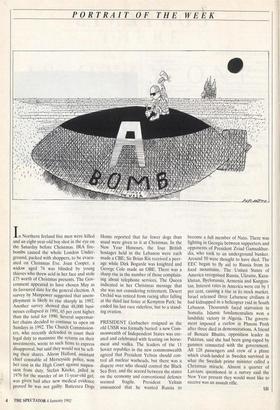PORTRAIT OF THE WEEK
In Northern Ireland five men were killed and an eight-year-old boy shot in the eye on the Saturday before Christmas. IRA fire- bombs caused the whole London Under- ground, packed with shoppers, to be evacu- ated on Christmas Eve. Joan Cooper, a widow aged 74 was blinded by young thieves who threw acid in her face and stole 05 worth of Christmas presents. The Gov- ernment appeared to have chosen May as its favoured date for the general election. A survey by Manpower suggested that unem- ployment is likely to rise sharply in 1992. Another survey showed that 48,000 busi- nesses collapsed in 1991, 65 per cent higher than the total for 1990. Several supermar- ket chains decided to continue to open on Sundays in 1992. The Church Commission- ers, who recently defended in court their legal duty to maximise the returns on their investments, wrote to such firms to express disapproval, but said they would not be sell- ing their shares. Alison Halford, assistant chief constable of Merseyside police, won her case in the High Court against suspen- sion from duty. Stefan Kiszko, jailed in 1976 for the murder of an 11-year-old girl, was given bail after new medical evidence proved he was not guilty. Battersea Dogs
Home reported that far fewer dogs than usual were given to it at Christmas. In the New Year Honours, the four British hostages held in the Lebanon were each made a CBE; Sir Brian Rix received a peer- age while Dirk Bogarde was knighted and George Cole made an OBE. There was a sharp rise in the number of those complain- ing about telephone services. The Queen indicated in her Christmas message that she was not considering retirement. Desert Orchid was retired from racing after falling at the third last fence at Kempton Park: he ended his last race riderless, but to a stand- ing ovation.
PRESIDENT Gorbachev resigned as the old USSR was formally buried: a new Com- monwealth of Independent States was cre- ated and celebrated with feasting on horse- meat and vodka. The leaders of the 11 Soviet republics in the new commonwealth agreed that President Yeltsin should con- trol all nuclear warheads, but there was a dispute over who should control the Black Sea fleet, and the accord between the states on the economy and conventional defence seemed fragile. President Yeltsin announced that he wanted Russia to become a full member of Nato. There was fighting in Georgia between supporters and opponents of President Zviad Gamsakhur- dia, who took to an underground bunker. Around 50 were thought to have died. The EEC began to fly aid to Russia from its food mountains. The United States of America recognised Russia, Ukraine, Kaza- khstan, Byelorussia, Armenia and Kurgyzs- tan. Interest rates in America were cut by 1 per cent, causing a rise in its stock market. Israel released three Lebanese civilians it had kidnapped in a helicopter raid in South Lebanon. Thousands faced starvation in Somalia. Islamic fundamentalists won a landslide victory in Algeria. The govern- ment imposed a curfew in Phnom Penh after three died in demonstrations. A friend of Benazir Bhutto, opposition leader in Pakistan, said she had been gang-raped by gunmen connected with the government. All 128 passengers and crew of a plane which crash-landed in Sweden survived in what the Swedish prime minister called a Christmas miracle. Almost a quarter of Latvians questioned in a survey said the New Year present they would most like to receive was an assault rifle.
SB










































 Previous page
Previous page